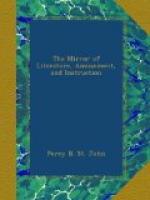A jolly wight comes by upon
A sorry mare, that surely came
Of pagan blood and bone;
For down upon her knees she went,
To many a stock and stone!
Now seeing Huggins’ nag adrift,
This farmer, shrewd and sage,
Resolv’d by changing horses here,
To hunt another stage!
So up on Huggins’ horse he got,
And swiftly rode away,
While Huggins mounted on the mare
Done brown upon a bay!
And off they set, in double chase,
For such was fortune’s
whim,
The Farmer rode to hunt the stag,
And Huggins hunted him.
* * * * *
And, far remote, each scarlet coat
Soon flitted like a spark,—
Tho’ still the forest murmur’d
back
An echo of the bark.
But sad at soul John Huggins turn’d:
No comfort he could find.
Whilst thus the “Hunting Chorus”
sped
To stay five bars behind.
For tho’ by dint of spur he got
A leap in spite of fate—
Howbeit there was no toll at all,
They could not clear the gate.
And, like Fitzjames, he cursed the hunt,
And sorely cursed the day,
And mus’d a new Gray’s elegy
On his departed gray.
Huggins now betook him to the Wells—the Hunt was o’er—and many a joke is told—
How Huggins stood when he was rubb’d
By help and ostler kind,
And when they cleaned the clay before,
How “worse remain’d
behind.”
And one, how he had found a horse
Adrift—a goodly
gray!
And kindly rode the nag, for fear
The nag should go astray.
Huggins claims the horse, and offers “a bottle and a pound” for his recovery:
The wine was drunk,—the money
paid,
Tho’ not without remorse.
To pay another man so much,
For riding on his horse.
MORAL.
Thus Pleasure oft eludes our grasp,
Just when we think to grip
her;
And hunting after Happiness,
We only hunt a slipper.
The tale occupies less than thirty pages, and may be read whilst smoking a cigar. It is all quaint fun, whim, humour, and frolic, and one of those merry morsels which amuse us more than the whole leaven of utilitarianism; and if to laugh and learn be your maxim, why read the “Epping Hunt.” After this, hold your sides, and look at the cuts, designed by George Cruikshank, and engraved by Branston, Bonner, Slader, and T. Williams. Old Tom Rounding is the frontispiece, in a cosy chair, and glass in hand—framed with foxes’, and Towler and Jowler’s heads, antlers, &c. The rich twinkle of Tom’s eye, and the benevolent rotundity of his form, are admirable. Huggins hitched on a tree is the next—then comes “the beast charging in Tom’s rear;” his perturbed look and the saucy waggery of a round headed wight who has climbed into an adjoining tree are a good contrast; Huggins “sitting on a thorn” is another ludicrous picture of perturbation; the cit on the grass, with “cattle grazed here” on a tree, is the fifth; and Huggins being cleared of clay by two of Tom Roundhead’s helpers, with mop and broom, completes the cuts and catastrophes of the Epping Hunt.




